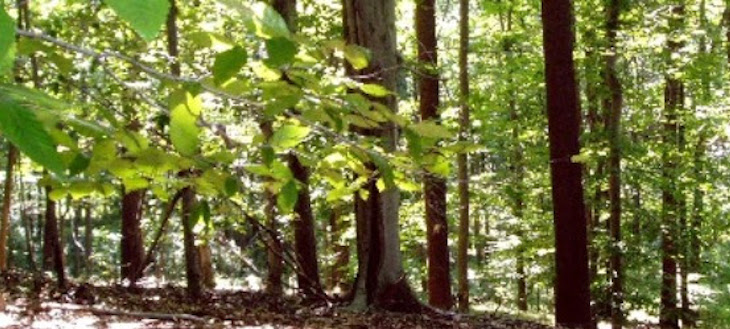The State We're In
Preserved lands protect clean air and water
“Forests are the ‘lungs’ of our land, purifying the air and giving fresh strength to our people. The forests are also needed for mitigating extreme climatic fluctuations, holding the soil on the slopes, retaining the moisture in the ground, and controlling the equable flow of water in our streams.”
-Franklin Delano Roosevelt, 1935
Our 32nd president was way ahead of the times when he eloquently described the value of forests to human health and well-being.
More than seven decades later, nature’s ability to clean water and air is more important than ever. Forests, wetlands and grasslands filter stormwater and recharge groundwater. Trees absorb carbon dioxide from the air and produce oxygen, allowing us to breathe easier.
These “ecosystem services” are especially critical in compact New Jersey, the nation’s most densely populated state, with over 9 million residents.
Fortunately, this state we’re in has been actively preserving forests for more than 65 years. The Garden State has large areas of protected forests, especially in the Highlands and the Pine Barrens, along with a growing expanse of permanently preserved farmland and grassland.
But there is still more land worthy of preservation, and continuing to preserve it is a wise investment in our future. By protecting lands near rivers, streams, lakes and reservoirs, we safeguard clean drinking water. By protecting forests and trees, we protect clean air and combat global warming.
According to a report by the Land Trust Alliance and the U.S. Fish and Wildlife Service, preserving land has enormous economic value because it reduces the need for expensive engineering facilities. The report, Investing in Nature, cites New York City’s water supply system as an example.
With its system of reservoirs north of the city, New York provides 1.2 billion gallons of clean drinking water daily. “And land protection is the key to its success, because the protected lands surrounding the reservoirs act as natural filters for the clean water that pours out of the city’s faucets,” according to the report. If the city had to pay for the services that nature provides for free, it would cost about $7 billion just for the water treatment infrastructure!
Decreasing reliance on fossil fuels and increasing our investment in clean, renewable energy is another way to protect New Jersey’s water and air. Governor Phil Murphy has signed legislation requiring 50 percent of New Jersey’s electricity to come from solar, offshore wind and other clean sources by 2030, and is developing an Energy Master Plan to achieve 100 percent by 2050.
Not only will this cut air pollution, it will also reduce the need for new fossil fuel infrastructure. New Jersey is facing a slew of proposed fracked gas pipeline projects that would damage preserved open space and farmland. These pipelines would also threaten waterways and drinking water, and conflict with Governor Murphy’s clean energy initiatives.
It is also important to protect water by upgrading infrastructure. Twenty-one of New Jersey’s older urban areas have “combined sewage systems,” which carry both sewage and stormwater to treatment plants. In times of heavy rain, these systems back up, spilling raw sewage into waterways and onto surrounding land, including parks, streets and neighborhoods. It’s expensive to modernize these outdated systems, but the problem can no longer be ignored.
All of these strategies are critical and need your support! Land preservation, a rapid transition to clean energy and improvements to aging water infrastructure are all actions we must take in the coming decades.
In the words of former U.S. Secretary of the Interior Stewart Udall, “Plans to protect air and water, wilderness and wildlife are, in fact, plans to protect man.”
To learn more about the economic benefits of protecting land and water click here. For more information on clean energy, go to www.rethinkenergynj.org. And for more on New Jersey’s water infrastructure, go to http://jerseywaterworks.org.
For more information on preserving New Jersey’s land and natural resources, visit the New Jersey Conservation Foundation website at www.njconservation.org or contact me at info@njconservation.org.
About the Authors
Alison Mitchell
Co-Executive Director
John S. Watson, Jr.
Co-Executive Director
Tom Gilbert
Co-Executive Director, 2022-2023
Michele S. Byers
Executive Director, 1999-2021
View their full bios here.
Filter
Get The Latest News
From The Garden State
In the
News

